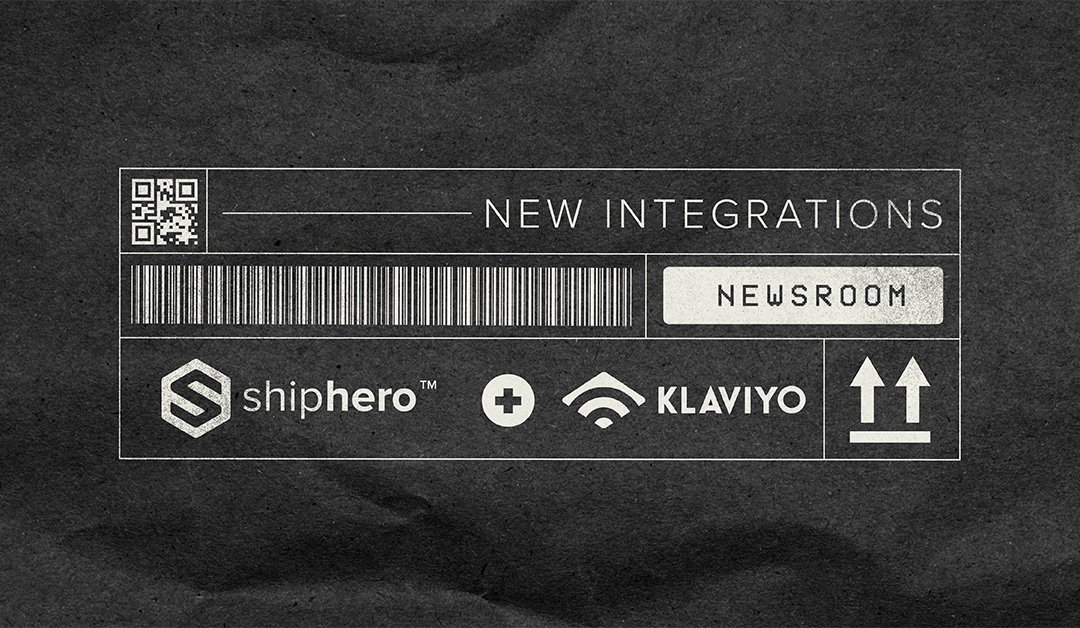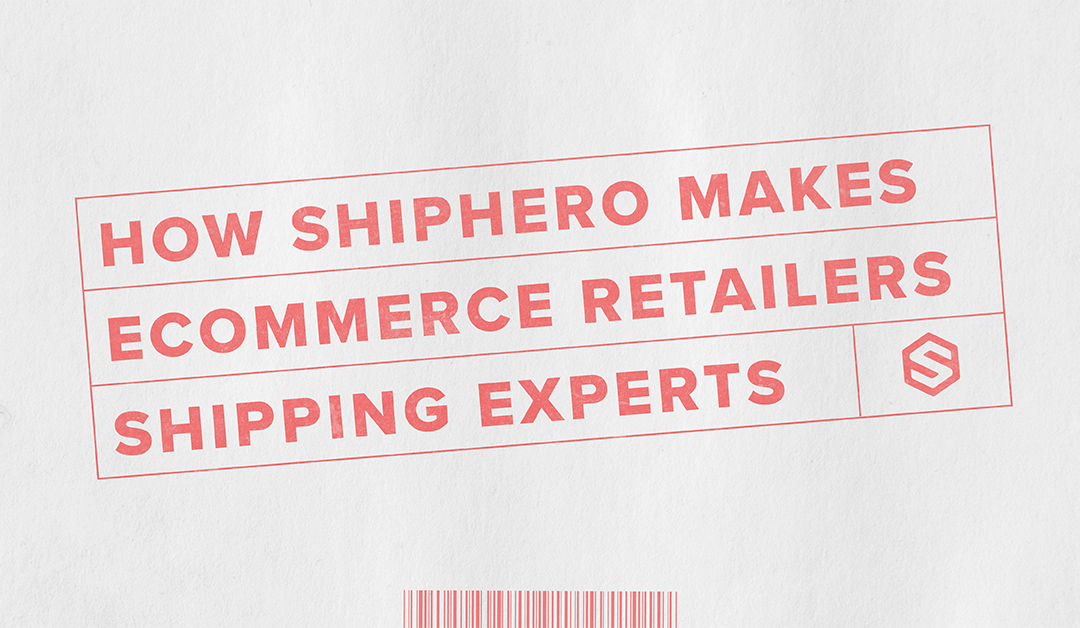
Feb 4, 2022 | Blog
By: Aaron Rubin, Founder & CEO of ShipHero
How many seconds or minutes have you ever spent searching for a pen, a folder, a paperclip under piles of paper, on the floor, in the trash can (how did it get in the trash can)? And once you’ve found it, now you’re annoyed you lost it in the first place, and your zen-like state of productivity is long gone.
Maybe this isn’t quite as common an occurrence as it once was, but there are always small things that get in the way of us working as efficiently as possible. A lost pen, 10 extra steps in the warehouse, an iPad with a dead battery … all of these take away from the time we could be working and kill our efficiency.
This is the story of how one adaptive gaming controller revolutionized our packing station efficiency leveraging our Warehouse Management Software (WMS) along with our strong warehouse processes.
Barcode Scanning Loses its Shine
There is no doubt that handheld barcode scanners are a lifesaver, especially when talking about picking and packing in a warehouse. They reduce errors, allow for better quality assurance and save time.
However, there is still always a bit of lag between picking up the scanner, scanning the barcode and then placing the scanner down to continue working. Especially when you’re in the critical packing phase of an order. Maybe it’s one or two seconds, but shave those few seconds off every order you pack, and you’ve accumulated a lot of time.
This was the challenge for our ShipHero fulfillment centers where we also use our WMS; our packers who were unbelievably fast, wanted to be faster. They were looking for a non-wearable option. However, when the team investigated other options, like buttons for example they were either unreliable, inconsistent or far too expensive to make logical sense. So, maybe the handheld barcode scanner was as good as it gets.
Gaming to the Rescue
ShipHero employee, Lucas Warner, was still frustrated by this issue. Knowing there had to be a solution to the button issue, he started to think about what type of device currently existed that was durable, adaptive and fairly easy to program.
The answer lies in the gaming community. Xbox® released an adaptive game controller meant for gamers with limited mobility and less-than-fine motor skills. This type of device was exactly what could work for packing stations at ShipHero. When combined with a Logitech® button kit and some open source software, a solution was born.
One (or 17) Buttons to Rule Them All
Now with the touch of one or two buttons, packers can instruct ShipHero’s WMS to print the label/invoice and complete the order. The system uses different box sizes as the main differentiator. Once the box barcode is “scanned” – again at the touch of a button, instead of a handheld barcode scanner, ShipHero’s WMS knows what to do.
In total, there are currently 17 buttons that can be programmed with different command codes. Two of them are taken by the first two functions mentioned above (print label/invoice, complete the order). The other 15 are up for grabs.
The cost to make this upgrade is nominal – in fact, it’s cheaper than a socket mobile scanner, which is what most of our clients use in their warehouses. The only hiccup right now is that, like many electronics devices, adaptive controllers and button kits can be hard to come by. So, if you’re looking to outfit a dozen stations, you might need to do it in waves instead of all at once.
But Why?
When any new process replaces an older one that seemingly still works, the question is always, “But why?” Why should you bother to make this change?
Here are my top reasons:
- It’s more efficient. Even your fastest packers will improve their speed.
- It’s more cost-effective in the long run. It costs less than socket mobile scanners and the controller is meant to be durable. In the 18 months we’ve been using them, they haven’t had one controller wear out. (One died, but that was an internal connection issue – it wasn’t from overuse).
- It’s fun! Call me crazy, but packing orders all day isn’t that much fun. Your packers will get the tactile satisfaction of slapping buttons and accomplishing something.
I realize this last one might seem like a little who cares? But consider your current warehouse situation. Who are you looking to hire? Chances are you need new workers that may be a part of a generation already familiar with gaming and the satisfaction it brings.
The gamification of shipping is not a passing fad – it’s more of a long-term solution.
For example, ShipHero introduced the Hero Board – a running list of the top packers for the day – and it’s been a huge success. It helps to motivate the entire team to get more done and work more efficiently. Using an adaptive controller adds even more of a game-like feel to this friendly competition.
There’s also no discounting the “coolness” factor.
Innovation is the Future
People are always talking about innovation, AI and robotics in warehousing. And that stuff is coming – for some of you it’s part of your daily routine, and for others it’s still on your bucket list. But this type of innovation – a possible 3x upgrade in efficiency for a couple of hundred bucks, might reap bigger dividends in the short term than you could imagine.
If you’re a current ShipHero WMS client, for steps on how to adapt your packer stations to game controller buttons, click HERE for the Knowledge Base article.
If you’re new to ShipHero, schedule a meeting today with our software experts to learn more about our WMS built for ecommerce brands & 3PLs looking to run their best warehouse and how ShipHero works to ensure that organizations invest in the solutions that match their needs, to improve productivity, revenue, and success.
Click HERE to Schedule a Meeting Today
Aaron Rubin, Founder & CEO
ShipHero
About the author: Aaron Rubin is the Founder & CEO of ShipHero. He is responsible for planning and executing the overall vision and strategy of the organization. Rubin’s greatest strengths are leadership, change management, strategic planning and a passion for progression. He is known for having his finger on the pulse of ShipHero’s major initiatives, his entrepreneurial spirit, and keen business acumen. His leadership of ShipHero is grounded in providing excellent customer service that drives improved business operations. His passion for ShipHero comes from the culture and his ability to have an impact on the lives of employees, customers, partners, and investors.
Follow Aaron on Twitter & LinkedIn.

Jan 28, 2022 | newsroom
Following the successful rollout in November 2021 for Fulfillment Clients, ShipHero is happy to announce that PostHero with Klaviyo, is now available to U.S. Software Clients. PostHero with Klaviyo tracks all the post-shipment events that are important to customers. It also gives ShipHero’s clients clearer insight into their shipping carrier performance and delivery stats. PostHero with Klaviyo is currently available to ShipHero Fulfillment Clients and Software Clients with brand accounts in the U.S.
This type of direct integration will help to raise the profile of ShipHero’s Software Clients by offering them the same transparency of their bigger rivals. It is also a huge benefit to customer satisfaction as details about package progress and delivery estimates can be better communicated.
More Insight with Klaviyo
PostHero already tracks packages across select U.S. carriers and provides insight by giving you the tools you need to truly understand your fulfillment process, even after the package has left the warehouse.
The Klaviyo integration brings all the power of Klaviyo’s workflows to ShipHero’s software. U.S. brand accounts can take advantage of Klaviyo’s workflows to trigger certain events depending on the status of a package. PostHero with Klaviyo for Software brand accounts will also provide an easy-to-read dashboard. This dashboard will display data on packages at certain steps in the fulfillment pipeline.
PostHero with Klaviyo:
- Tracks packages across U.S. carriers.
- Helps identify growth opportunities in shipping.
- Helps clients recognize and address fulfillment gaps.
More Visibility for Increased Success
The dashboard within ShipHero will provide insights like average transit time. This data can even be parsed at the state or carrier level. Currently, the available filters on the dashboard are:
- Carrier
- Date
- State
- Store
- Warehouse
The PostHero dashboard will also show any problematic orders, including those that are stuck, lost or delayed. Stuck (or lost) is defined as orders that were shipped, but not delivered, and there has been no update from the carrier in two business days. Delayed is defined as orders that were shipped 7 business days ago and were not delivered; but there has been a carrier update within the last two business days.
This insight gives ShipHero’s U.S. Software Clients more data that helps them further streamline and improve their shipment processes. And it lets them know which carriers perform the best for them and their customers.
“So many things can affect delivery,” Aaron Rubin, ShipHero’s Founder & CEO said. “It’s important to give our clients the ability to see as much as possible into that process. PostHero with Klaviyo provides powerful data that all eCommerce brands need.”
The Klaviyo integration with PostHero is available for ShipHero’s U.S. clients. PostHero currently supports USPS, UPS, FedEx, Endicia and Shippo.
For further details regarding the Klaviyo integration and how it can positively impact your eCommerce business, current ShipHero Clients should reach out to Client Support, HERE.
About ShipHero
ShipHero is a US based, leading provider of cloud-based eCommerce fulfillment solutions that gives online retailers and third-party logistics providers the tools to ship more efficiently anywhere in the world. With more than 5,000 customers located around the globe, ShipHero offers online retailers a suite of services ranging from warehouse management software to outsourced fulfillment as a service. Some notable customers include Mars, Universal Music Group and Canadian Tire. Additionally, ShipHero is the official fulfillment network partner for Shopify, and is rapidly scaling a network of warehouses throughout the US to meet the growing demands of today’s online retailers.

Jan 28, 2022 | Blog
By: Aaron Rubin, Founder & CEO of ShipHero
Providing fast, reliable shipping is crucial for growing your eCommerce retail brand. Pitney Bowe’s Holiday Shipping Survey found that over 90% of consumers consider shipping options a vital factor in their shopping experience, so meeting these expectations is crucial.
Unfortunately, eCommerce retailers face many challenges with shipping. Some of the most common issues are:
Scaling fulfillment as you grow
As your eCommerce brand grows, managing supply chain processes becomes increasingly challenging. More stock needs to be managed, more orders must be fulfilled, and your team may struggle to keep up. Eventually, hiring more workers becomes necessary, which drives your costs up and won’t necessarily optimize inventory management.
Keeping up with major retailers and their fast delivery speeds
Outdoing that one competitor that copied your brand colors and runs suspiciously similar marketing campaigns to yours isn’t difficult, but when it comes to shipping speeds, you’re not just competing with other brands.
You’re up against major eCommerce platforms like Amazon that offer expedited shipping, including free 2-day delivery options. Offering expedited shipping is costly for most growing eCommerce brands, and if you can pull it off, your options are to eat the costs or charge your customers more.
Unfortunately, both options have serious drawbacks and can hurt your bottom line significantly.
Knowing when & how to leverage data
Effectively managing fulfillment processes, including inventory, involves a great deal of data, analytics, and reporting. Unfortunately, many eCommerce retailers struggle with accurate data logging and making sense of the information.
Inventory reports, order history, pick and pack team reports, and other information is only useful if your team knows how to leverage them adequately.
Training & hiring warehouse fulfillment experts
Hiring a less experienced labor force may seem cost-effective on the surface. After all, fewer labor costs, less expenditure, right? Except it isn’t that simple.
Warehouse fulfillment includes many processes that have to be executed efficiently and with great care. Otherwise, orders get delayed, and packages are damaged. Since inexperienced workers are less efficient and prone to making mistakes, your bottom line may suffer from costly returns and unhappy customers. Your options are to either train a less-experienced workforce or to hire experts, and both choices can be quite expensive.
Demand forecasting & inventory management
How do eCommerce retailers know which products are running low and when to reorder? How do brands prepare for the peak holiday season and demand surges? Answer: by managing inventory and forecasting demand.
Unfortunately, efficiently managing inventory and accurately forecasting demand can be challenging. To monitor real-time inventory levels, eCommerce retailers need systems that actively record when items enter or leave the warehouse. Additionally, to forecast demand, you need systems that analyze previous data and industry trends to predict future orders.
eCommerce marketplace fulfillment
Marketplace fulfillment helps small and medium-sized eCommerce retailers gain a competitive edge, but marketplaces have strict tenants in place that are challenging to fulfill.
Marketplace fulfillment also comes with drawbacks that may hinder your customer’s experience – eCommerce retailers don’t have active control over the shipping process, which means you can’t directly prevent delays or incorrect deliveries.
Warehouse management software
Outdated warehouse management software (WMS) is not suited to meet the needs of modern eCommerce retailers. Many retailers have old WMS that is optimized for managing truck loads. However, the eCommerce market is overflowing with larger volumes of small orders. Thus, retailers need a WMS that can accurately track these orders, monitor inventory levels, and keep up with large order volumes.
Fulfillment tools
Fulfillment tools have come a long way – retailers can now optimize warehousing processes with the help of automation, conveyor belts, machinery such as cranes and forklifts, and even robots. However, buying these fulfillment tools requires a significant initial investment, and managing them requires a skilled labor force.
Thus, eCommerce retailers struggle to get the most out of fulfillment tools, because training and hiring a skilled workforce is expensive and time-consuming for growing brands.
Carrier pricing
Shipping prices vary from carrier to carrier, and there is no designated ‘best’ partner to ship with. Some carriers may offer better rates for smaller packages, while others may be ideal for heavier items. To keep your costs low, and the prices your customers pay, it’s important to pick the carrier offering the lowest rates for each order.
Unfortunately, calculating shipping rates with different carriers for each order, and comparing the costs, is a challenge many eCommerce retailers face.
How ShipHero’s WMS turns you into a fulfillment expert
ShipHero’s leading warehouse management software helps the fastest growing eCommerce retailers scale their fulfillment operations and optimize their workflow.
And here’s how.
Automation rules & APIs
ShipHero’s WMS lets retailers set automation rules in response to actions and triggers. You can set automation rules to send order-related emails, set reorder points, and select shipping methods based on zip codes.
Additionally, ShipHero’s API is built on GraphQL to meet the needs of individual businesses. You have complete control over how much data to pull based on your unique implementation needs.
Better analytics & reporting
ShipHero’s WMS delivers real-time data and analytics, so eCommerce retailers can accurately track inventory, optimize inventory management processes, and identify replenishment needs.
Faster shipping & fewer returns
ShipHero’s tech-enabled fulfillment experts cut down picking and packing times, reduce errors, and carefully manage your packages to protect them from damages. As a result, your orders are shipped faster, and customer returns requests decrease.
Inventory management
ShipHero’s WMS also streamlines inventory management by actively monitoring inventory levels, issuing reorder alerts, multi-warehouse and order allocations to manage automatic product allocation and more.
Mobile pick & pack tools
ShipHero’s secure mobile pick & pack tools help your fulfillment team pick orders faster and more accurately, decreasing shipping times and errors. The mobile application’s intuitive interface takes just 24 hours to get used to, and your team can leverage barcode scanning functionality to guarantee accurate pickings.
Additionally, with ShipHero’s BulkShip feature, your team can process bulk orders faster with less manual overhead.
Powerful order management capabilities
ShipHero’s WMS integrates directly with all major eCommerce platforms and marketplaces, including Amazon, Shopify, WooCommerce, eBay and more. After integrating into your store, ShipHero’s WMS makes sure your orders are delivered on time.
Retailers can use ShipHero’s WMS to track orders and update inventory data, validate customer addresses and details, automatically assign orders, set automation rules, and more.
Smart warehouse routing
ShipHero’s WMS comes with smart warehouse routing that retailers use to automatically allocate orders to any location, as soon as the customer completes the sale.
Or let ShipHero handle fulfillment for you
ShipHero’s leading WMS is trusted by thousands of eCommerce retailers, including leading Fortune 500 brands. However, some merchants prefer to outsource their fulfillment process entirely, so they can focus on growing their eCommerce brand.
If you’re looking for an experienced, tech-enabled team to manage your order fulfillment process, here’s why ShipHero is the top choice for fast-growing eCommerce brands:
Real-time visibility
ShipHero Fulfillment keeps our eCommerce partners in the loop by providing real-time visibility and transparency. You can view and track orders, and see how they were packed and when they were shipped.
Inventory management tools
ShipHero’s industry-leading WMS optimizes your inventory and warehouse management processes to cut costs, reduce errors, and deliver better customer experiences. With our accurate demand forecasting, eCommerce retailers are safe from overstocking or running out of in-demand items.
2-day and overnight delivery
ShipHero Fulfillment helps even the fastest-growing retailers keep up with large order volumes and consistently offer expedited shipping at affordable rates. With ShipHero, you can deliver the best customer experiences without compromising your bottom line.
Conclusion
With the eCommerce sector becoming increasingly competitive, eCommerce brands have to meet customer expectations and outdo their competitors to grow steadily. While retailers face many shipping challenges, technology, automation, and an experienced workforce can help brands overcome these issues.
Advanced warehouse management software like ShipHero’s helps eCommerce retailers fulfill modern needs, offering advanced analytics and reporting, accurate forecasting, automation rules, and mobile tools to decrease errors and reduce picking times.
However, some businesses may benefit more from outsourcing their fulfillment processes entirely to a third party, like ShipHero Fulfillment. In fact, because of how effective 3PLs are, around 90% of Fortune 500s have partnered with one.
So whether you need a powerful WMS or the best fulfillment partner, start growing your eCommerce brand today with ShipHero.
Schedule a meeting today with our experts to learn more about our WMSbuilt for eCommerce brands & 3PLs looking to run their best warehouse and how ShipHero works to ensure that organizations invest in the solutions that match their needs, to improve productivity, revenue, and success.
Click HERE to Schedule a Meeting Today
Aaron Rubin, Founder & CEO
ShipHero
About the author: Aaron Rubin is the Founder & CEO of ShipHero. He is responsible for planning and executing the overall vision and strategy of the organization. Rubin’s greatest strengths are leadership, change management, strategic planning and a passion for progression. He is known for having his finger on the pulse of ShipHero’s major initiatives, his entrepreneurial spirit, and keen business acumen. His leadership of ShipHero is grounded in providing excellent customer service that drives improved business operations. His passion for ShipHero comes from the culture and his ability to have an impact on the lives of employees, customers, partners, and investors.
Follow Aaron on Twitter & LinkedIn.



